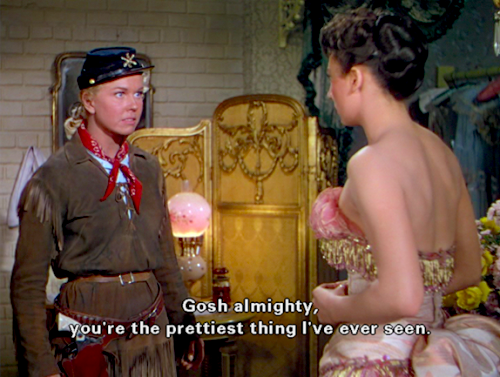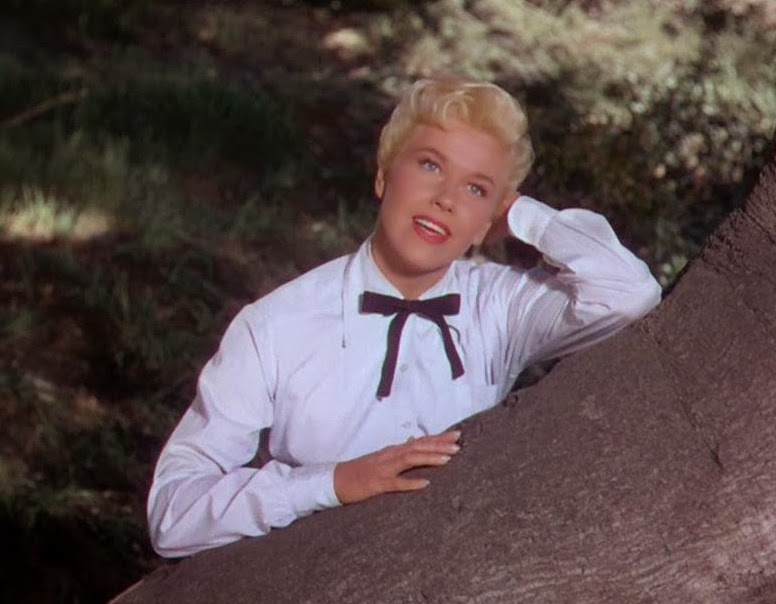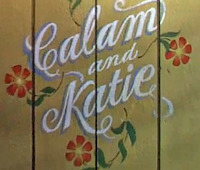Queering the Oscars: Calamity Jane's "Secret Love"
 Friday, June 16, 2023 at 1:00PM
Friday, June 16, 2023 at 1:00PM For Pride Month Team Experience is looking at LGBTQ+ moments in Oscar history.

by Nathaniel R
When we decided to do this series we left it up to contributors to pick their topics. Does an movie achievement qualify as queer because of an aesthetic sensibility? Because the artists involved were LGBTQ+? Because of subject matter or characters? Any of those! With Old Hollywood movies one of the most common 'qualifying' reasons -- it's all very subjective of course -- is whether or not a movie or singular element of a movie was 'adopted' by the queer community. In this regard "Secret Love," the Oscar-winning ballad from the western musical comedy Calamity Jane more than qualifies...
 Doris Day singing one of her #1 hits, "Secret Love"
Doris Day singing one of her #1 hits, "Secret Love"
Back in 1953 there weren't exactly gay indie films and the Stonewall riots were still sixteen years into the future -- science fiction if you will. But there were still queer people and some films, performers, art, and in this case songs resonated with them.
The resonance for The Love That Dare Not Speak Its Name in the pre-civil rights era is impossible to miss in "Secret Love" ...as plain as Day (Doris and otherwise) in the lyrics.
Once I had a secret love
That lived within the heart of me
All too soon my secret love
Became impatient to be free
So I told a friendly star
The way that dreamers often do
Just how wonderful you are
And why I'm so in love with you
Now I shout it from the highest hills
Even told the golden daffodils
At last my heart's an open door
And my secret love's no secret anymore
Once Jane starts radiantly "shouting" her love from the highest hills, she can't stop. The relief is so nice, she sings the stanza twice.
 Now of course Jane's 'secret' love in this case is a heterosexual affection (fellow frontier legend Wild Bill Hickok played by fellow 50s musical star Howard Keel), but it's all about the subliminal. Jane is a tomboy who seems delighted that people mistake her for a man. She also befriends "the purtiest thing" she's ever seen, Katie, and they adorn the home they share with "Calam and Katie" painted on the door.
Now of course Jane's 'secret' love in this case is a heterosexual affection (fellow frontier legend Wild Bill Hickok played by fellow 50s musical star Howard Keel), but it's all about the subliminal. Jane is a tomboy who seems delighted that people mistake her for a man. She also befriends "the purtiest thing" she's ever seen, Katie, and they adorn the home they share with "Calam and Katie" painted on the door.
So the movie is fun to view through the lens of a lesbian or a trans romance. Doris Day was later a somewhat controversial figure to the queer community (if they knew her at all) for being conservative politically. But in her era she was beloved by the gays and lesbians, as key female singers have been to each queer generation.
At the 26th Oscars on March 25th, 1954, hosted by Donald O' Connor, From Here to Eternity starring Montgomery Clift was the big winner taking home 8 Oscars from 13 nominations. The western Oscar voters loved that year was Shane which was up for prizes in several categories. But Calamity Jane was the only western to win an Oscar that year taking Best Original Song (it was also up for Best Scoring of a Musical Picture). The song, which had hit #1 on the charts around the time Oscar nominations were announced was still a big seller when the ceremony came, at #4 on the charts.
Doris Day opted out of performing on Oscar night so Ann Blyth (Veda Pierce herself!) performed the number instead for the industry assembled at the RKO Pantages Theatre that night. Her own headlining western musical Rose Marie (1954) has just premiered a few weeks earlier.
Best Original Song 1953
- "The Moon is Blue" from The Moon is Blue
- "My Flaming Heart" from Small Town Girl
- "Sadie Thompson's Song" from Miss Sadie Thompson
- ★ "Secret Love" from Calamity Jane
- "That's Amore" from The Caddy
While most of the nominees are unfamiliar to modern audiences, "That's Amore" (a massive hit for Dean Martin) became a standard, too.
"Secret Love", written by two married men, Sammy Fain (music) and Paul Francis Webster (lyrics), may have been adopted as a gay anthem but it was also a mainstream smash hit, covered by many other artists after the fact including Bing Crosby, Count Bassie, Billy Stewart, George Michael and Loretta Lynn.
Calamity Jane is available to rent online through various sources.




Reader Comments (2)
Mandy Moore also has a very lovely version of the song.
https://www.youtube.com/watch?v=fieNHFylrqw It was from the "Mona Lisa Smile" soundtrack!
Lovely song.
And these old clips are precious.
A very creative way to present Best Original Song in 1953.